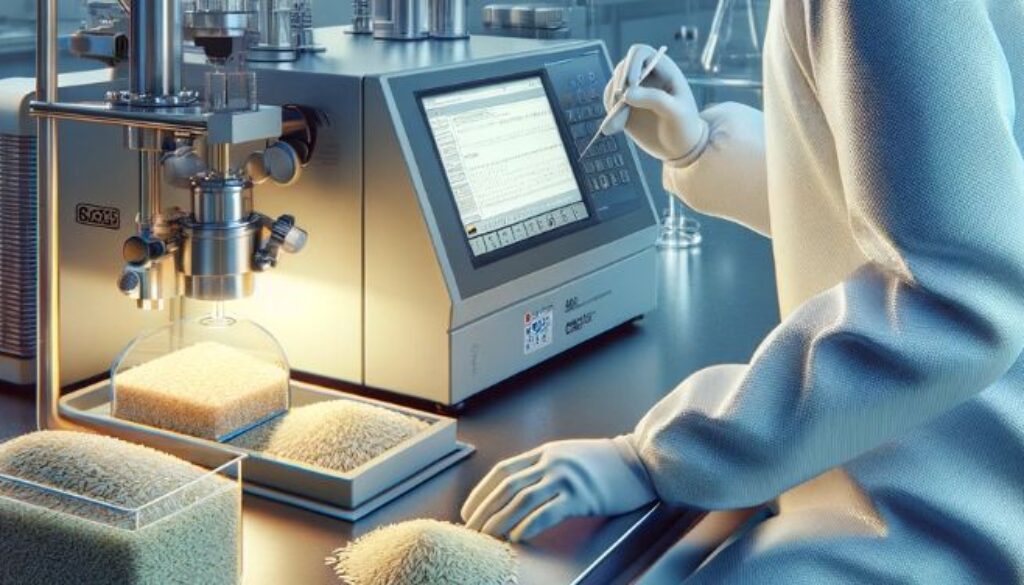Detection Of Multiple Pesticide Residues In Rice Based On Quechers-Gas Chromatography-Tandem Mass Spectrometry
Advanced analytical method utilizing QuEChERS and GC-MS/MS for detecting pesticides in rice, ensuring food safety with high accuracy and efficiency.
method based on QuEChERS-gas chromatography-tandem mass spectrometry was established for the determination of profenfos, pyrofenthrin, difenfosin, pendimethalin, flusilazole, alachlor, methyl parathion, fenthrin, etc. in rice 8 Methods to grow pesticide residues. The QuEChERS method was used for sample pretreatment. The rice sample was extracted with acetonitrile, and then tested after purification with PSA and C18 powder and anhydrous MgSO4. The results showed that the linear range of the eight pesticides was 0.001~1.0 ¦Ìg/mL, the correlation coefficient was greater than 0.99, the pesticide spike recovery rate was 89.4%~105.0%, and the RSD was 1.3%~6.3%. This method is simple, sensitive, stable and has a high recovery rate, and is suitable for the quantitative detection and qualitative confirmation of multiple pesticide residues in rice.
Introduction to a Novel Analytical Method for Pesticide Detection
In the pursuit of ensuring food safety, especially concerning staple crops like rice, the development of efficient and reliable analytical methods for pesticide residue detection is crucial. Recent advancements in analytical chemistry have led to the establishment of a novel method based on the QuEChERS approach coupled with gas chromatography-tandem mass spectrometry (GC-MS/MS). This method has been meticulously developed for the determination of a variety of pesticide residues in rice, including profenfos, pyrofenthrin, difenfosin, pendimethalin, flusilazole, alachlor, methyl parathion, and fenthrin. These compounds are known for their widespread use in agriculture to protect crops but pose potential risks to human health if residues remain in food products.
Employing QuEChERS for Sample Preparation
The QuEChERS method, which stands for Quick, Easy, Cheap, Effective, Rugged, and Safe, is employed for sample pretreatment. This process involves the extraction of pesticide residues from the rice sample using acetonitrile as the solvent. Following extraction, the sample undergoes a purification process using primary-secondary amine (PSA) and C18 powder along with anhydrous magnesium sulfate (MgSO4) to remove impurities and potential interferences. This preparation is essential for achieving accurate and reliable analytical results.
Analytical Performance and Sensitivity
The analytical performance of this method has been rigorously evaluated, demonstrating a high degree of sensitivity and precision. The linear response range for the eight targeted pesticides is between 0.001 to 1.0 µg/mL, with a correlation coefficient (R^2) exceeding 0.99. Such a high correlation indicates excellent linearity, thereby ensuring the method’s suitability for quantifying low to moderate levels of pesticide residues in rice. Moreover, the method exhibits a spike recovery rate ranging from 89.4% to 105.0% and a relative standard deviation (RSD) between 1.3% and 6.3%. These parameters highlight the method’s efficiency in recovering pesticides from rice samples and its reproducibility across different analyses.
Advantages and Suitability for Food Safety Analysis
The proposed analytical method stands out for its simplicity, sensitivity, stability, and high recovery rate. It is well-suited for the quantitative detection and qualitative confirmation of multiple pesticide residues in rice, offering a robust tool for food safety laboratories and regulatory agencies. Ensuring the minimal presence of pesticide residues in food products is essential for protecting consumer health and maintaining trust in agricultural practices. The adoption of such advanced analytical methods plays a pivotal role in the comprehensive monitoring of food safety, aiding in the enforcement of regulatory standards and the promotion of sustainable agricultural practices.
Conclusion: Enhancing Food Safety and Supporting Sustainable Practices
In conclusion, the integration of the QuEChERS method with gas chromatography-tandem mass spectrometry represents a significant advancement in the field of food safety analysis. By providing a reliable and efficient approach for detecting pesticide residues in rice, this method contributes to the ongoing efforts to ensure the safety and quality of food products, thereby protecting public health and supporting sustainable development goals.
For futher details of this article and research, feel free to contact our team for assistance.
Original research was done by Sun Changhua, Yu Zhiyong, Wang Jun, Cai Changchun, Zhou Li, Zhang Xiao
About ETprotein:
ETprotein, a reputable plant protein vegan protein Chinese factory manufacturer and supplier, is renowned for producing, stocking, exporting, and delivering the highest quality organic bulk vegan protein and plant proteins. They include Organic rice protein, clear rice protein, pea protein, clear pea protein, oat protein, watermelon seed protein, pumpkin seed protein, sunflower seed protein, mung bean protein, peanut protein, various of plant peptides etc. Their offerings, characterized by a neutral taste, non-GMO, allergen-free attributes, cater to a diverse range of industries. They serve nutraceutical, pharmaceutical, cosmeceutical, veterinary, as well as food and beverage finished product distributors, traders, and manufacturers across Europe, USA, Canada, Australia, Thailand, Japan, Korea, Brazil, and Chile, among others.
ETprotein specialization includes exporting and delivering tailor-made protein powder and finished nutritional supplements. Their extensive product range covers sectors like Food and Beverage, Sports Nutrition, Weight Management, Dietary Supplements, Health and Wellness Products, and Infant Formula, ensuring comprehensive solutions to meet all your protein needs.
As a trusted company by leading global food and beverage brands and Fortune 500 companies, ETprotein reinforces China’s reputation in the global arena. For more information or to get a free sample of their protein products, please contact them and email sales(at)ETprotein.com today.












